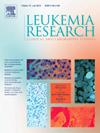Clinical applicability of the ELN2020 criteria for tyrosine kinase inhibitor discontinuation in chronic myeloid leukemia: insights from a multicenter retrospective study in real-world practice
IF 2.1
4区 医学
Q3 HEMATOLOGY
引用次数: 0
Abstract
The prognosis of chronic myeloid leukemia has significantly improved with the introduction of tyrosine kinase inhibitors (TKIs). However, indefinite TKI treatment can lead to adverse effects and high costs. Recent studies have suggested that treatment-free remission (TFR) is achievable in patients with a deep molecular response (DMR). The present multicenter, retrospective observational study conducted in Japan evaluated the applicability of the European LeukemiaNet (ELN) 2020 TKI discontinuation criteria, which recommend TKI therapy of ≥ 5 years with sustained MR4 for ≥ 3 years or MR4.5 for ≥ 2 years. A total of 100 patients who discontinued TKI therapy were analyzed, with 70 meeting the ELN2020 criteria. The overall 12-month TFR rate was 71.9 %. Univariate analysis showed that both the duration of DMR and TKI therapy were significantly associated with TFR, with hazard ratios (HR) of 0.305 and 0.450, respectively. Only DMR duration remained significant (HR 0.362) in multivariate analysis. Patients who lost MMR after TKI discontinuation rapidly re-achieved molecular response upon TKI resumption. The most common reason for TKI discontinuation was elective cessation, followed by adverse events, among which pleural effusion due to dasatinib was the most frequent. The results of this study, the first to assess the ELN2020 criteria in a Japanese cohort, suggest that the criteria are applicable in real-world clinical practice.
ELN2020标准在慢性髓性白血病中酪氨酸激酶抑制剂停药的临床适用性:来自现实世界实践的多中心回顾性研究的见解
随着酪氨酸激酶抑制剂(TKIs)的引入,慢性髓性白血病的预后显著改善。然而,无限期的TKI治疗可能导致不良反应和高昂的费用。最近的研究表明,在具有深度分子反应(DMR)的患者中,无治疗缓解(TFR)是可以实现的。目前在日本进行的多中心回顾性观察性研究评估了欧洲白血病网(ELN) 2020 TKI停药标准的适用性,该标准建议TKI治疗≥ 5年,持续MR4≥ 3年或MR4.5≥ 2年。共分析了100例停止TKI治疗的患者,其中70例符合ELN2020标准。总体12个月TFR为71.9 %。单因素分析显示,DMR和TKI治疗持续时间与TFR均显著相关,风险比(HR)分别为0.305和0.450。在多变量分析中,只有DMR持续时间仍然显著(HR 0.362)。停用TKI后失去MMR的患者在恢复TKI后迅速重新获得分子反应。TKI停药最常见的原因是选择性停药,其次是不良事件,其中达沙替尼引起的胸腔积液最为常见。这项研究首次在日本队列中评估了ELN2020标准,结果表明该标准适用于现实世界的临床实践。
本文章由计算机程序翻译,如有差异,请以英文原文为准。
求助全文
约1分钟内获得全文
求助全文
来源期刊

Leukemia research
医学-血液学
CiteScore
4.00
自引率
3.70%
发文量
259
审稿时长
1 months
期刊介绍:
Leukemia Research an international journal which brings comprehensive and current information to all health care professionals involved in basic and applied clinical research in hematological malignancies. The editors encourage the submission of articles relevant to hematological malignancies. The Journal scope includes reporting studies of cellular and molecular biology, genetics, immunology, epidemiology, clinical evaluation, and therapy of these diseases.
 求助内容:
求助内容: 应助结果提醒方式:
应助结果提醒方式:


